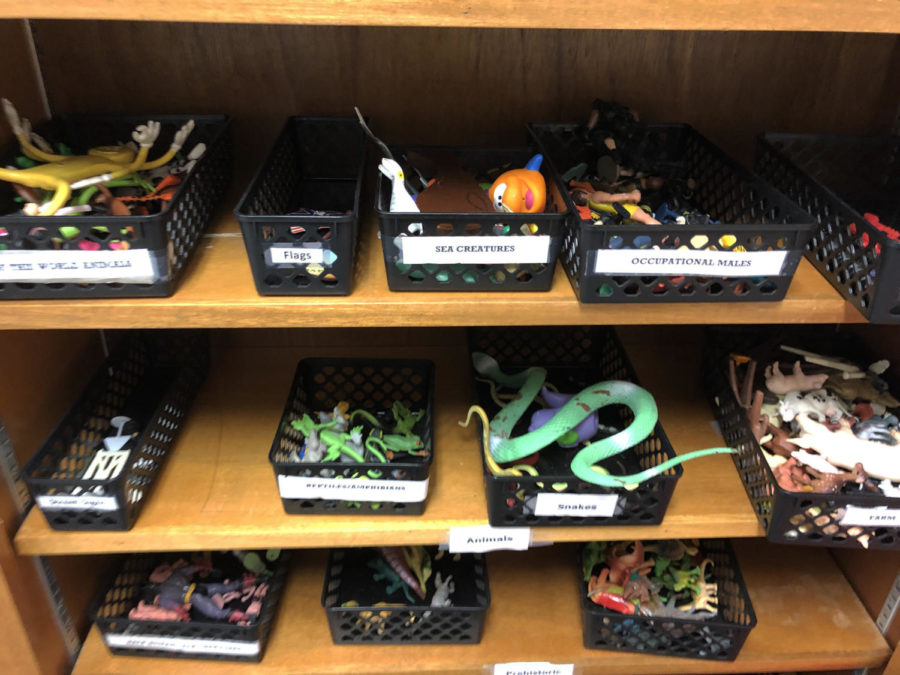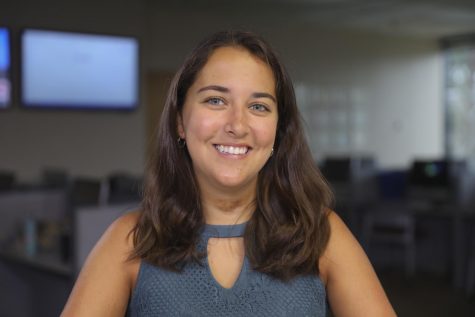Play Therapy Center merges toys with mental health
Baskets of children’s toys line the play therapy center housed in Mercy Hall. Photo credit: Erin Snodgrass
February 24, 2019
Last week, LeAnne Steen played in a sandbox with a toy turtle and bridge. Not because she’s a child — in fact, she’s a therapist with a Ph. D. No, she was engaging in play therapy. And understandably so, as she is the creator and director of the Loyola University Play Therapy Center of Education and Research, housed in Loyola’s newly opened, sliding-scale mental-health clinic.
Tuesday, Feb. 19, the play therapy clinic held an open house where Steen and graduate interns who work at the facility showcased the space and services offered. While the educational center has existed at Loyola since 2008, the clinic has just started seeing members of the community this past semester.
“It’s going well,” Steen said about the new development at the clinic. “We’ve had several child clients. We’re starting a parent education group where we teach parents the basic skills that play therapists use.
It is the only center approved by the National Association of Play Therapy in Louisiana and is one of only thirty such centers throughout the country.
“The idea is that play is a language. It’s symbolic and pre-verbal and it’s a way that children process,” Steen said. “So, even non-verbal children can benefit from play therapy.”
The center serves both as a place for education as well as a clinic providing play therapy to members of the community. The space consists of a small room filled with toys, ranging from action figures to children’s medical equipment and a variety of sandboxes. Books line the walls with advice on how children can deal with events like death and divorce.
“The toys in a play therapy room are selected, not collected,” Steen said. “Because, we use specific toys for specific ways for children to express themselves.”
When treating patients, Steen allows the children to explore the room while she tracks what they’re choosing and how they’re playing. This allows her to understand what they are trying to communicate.
“If they’re being a cashier or a medical person, that’s basic perspective taking. It gives them a sense of control over something they don’t usually have control over,” Steen said. “And that has cathartic, therapeutic value.”
Every three years, the center has to have its approval renewed by the national association. Centers can acquire points by providing play therapy classes, having a laboratory and clinic, and publishing research in play therapy. The center was renewed in May of 2016.
The play therapy clinic is now under the umbrella of Loyola’s new Center for Counseling and Education. The center is housed in Mercy Hall and opened earlier this month. The center aims to provide mental healthcare to uninsured and under-insured New Orleanians.
Sarah Zoghbi, co-founding director of program development for the counseling center, said nobody is turned away for lack of funds.
Zoghbi and John Dewell, the clinical director, have been collaborating on the opening of the clinic for the past 14 months.
“The whole purpose of it was to be able to provide services for people, and, now that they’re actually able to get it, it’s great,” Zoghbi said.
As for Steen in the play therapy center, she appreciates the opportunity to showcase the center’s resources and services.
“When you have an active play therapist with you, the therapeutic value increases because somebody is understanding,” Steen said. “We all know the value of being understood.”








